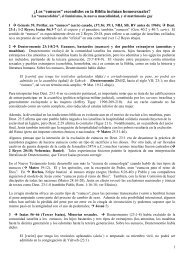Deuteronomy: - Fundación Otras Ovejas de Argentina
Deuteronomy: - Fundación Otras Ovejas de Argentina
Deuteronomy: - Fundación Otras Ovejas de Argentina
Create successful ePaper yourself
Turn your PDF publications into a flip-book with our unique Google optimized e-Paper software.
Ammonites or Moabites enter the assembly (23:3-8, with Edomites and Egyptians accepted only after three<br />
generations), it is surprising to find that the book lays such emphasis on the protection of immigrants (gerim)—22<br />
times, twice the amount of texts that mention widows and orphans. 15 For example, Yahweh gives the following<br />
command to the judges:<br />
Give the members of your community a fair hearing, and judge rightly between one person and another,<br />
whether citizen or resi<strong>de</strong>nt alien (ger, Deut. 1:16; see 27:19 + orphans and widows; other dimensions of<br />
justice in 27:17, unmoveable boundary markers, and in v. 25, bribes).<br />
The Ten Commandments guarantee sabbatical rest for the gerim, but not for the orphans or the widows (Deut. 5:14<br />
// Ex. 20:10). But, much more than justice, <strong>Deuteronomy</strong> commands love for the immigrant:<br />
18 [Yahweh]…executes justice for the orphan and the widow and…loves (‘ahab) the strangers (gerim),<br />
providing them food and clothing. 19 You shall also love (‘ahab) the stranger (ger), for you were strangers<br />
(gerim) in the land of Egypt (Deut. 10:18-19; � Lev. 19:34; Ex. 22:21; 23:9; see Abraham, Gen. 12:10;<br />
23:4; � Hebrews 11:9; 1 Peter 1:1 and 2:11).<br />
As is common elsewhere in <strong>Deuteronomy</strong>, the Exodus is presented here as a motive and paradigm for the praxis of<br />
the Israelite community, both in its liberating justice and its loving solidarity (―providing him with food and<br />
clothing;‖ � Matthew 25:31-46). Apart from justice in the courts and loving solidarity (clothing and food),<br />
<strong>Deuteronomy</strong> commands that every three years the tithes should be <strong>de</strong>stined to four classes of weak people (the<br />
or<strong>de</strong>r in which they are mentioned is significant, reflecting the priorities of the ―social security‖ program in the<br />
whole book:<br />
The Levites, because they have no allotment or inheritance with you, as well as the resi<strong>de</strong>nt aliens (gerim),<br />
the orphans, and the widows in your towns, may come and eat their fill (Deut. 14:29; see 26:12-13 and<br />
other texts).<br />
<strong>Deuteronomy</strong> 24:17-21 repeats the former exhortations that reclaim liberating justice and loving solidarity for the<br />
three aforementioned weak classes, un<strong>de</strong>rscoring the Exodus paradigm:<br />
17 You shall not <strong>de</strong>prive a resi<strong>de</strong>nt alien (ger) or an orphan of justice (mishpat); you shall not take a<br />
widow‘s garment in pledge. 18 Remember that you were a slave in Egypt and Yahweh your God re<strong>de</strong>emed<br />
you from there; therefore I command you to do this.<br />
When gathering the sheafs from the field, or the olives or the grapes, Yahweh comman<strong>de</strong>d that the owners leave a<br />
portion behind for the three classes of weak people, thus echoing the Exodus paradigm:<br />
21 When you gather the grapes of your vineyard, do not glean what is left; it shall be for the alien (ger), the<br />
orphan and the widow. 22 Remember that you were a slave in the land of Egypt; therefore I am<br />
commanding you to do this (Deut. 24: 21-22).<br />
Note: In 24:21 ger is best translated as ―immigrant‖, not as ―foreigner‖, since the latter word might suggest tourists<br />
arriving in a jet and spending two weeks of luxury vacations at the Sheraton. Thus, unlike most translations, we<br />
always translate ger as ―immigrant‖, not as ―foreigner‖. The 11 texts where ger occurs along with ―widow/s‖ and<br />
―orphans‖ are: 10:18; 14:29; 16:11,14; 24:17,19,20,21; 26:12,13; 27:19. Furthermore, ger occurs in 11 texts that<br />
do not mention widows and orphans: 1:16; 5:14 (// Ex. 20:10); 14:21; 23:7; 24:14 (+ sakir); 28:43; 29:10; 31:12<br />
(total 22 times in <strong>Deuteronomy</strong>). The explanation for this statistic could be that<br />
� traditionally, many Levites were single and itinerant priests (� Judges; 1-2 Chronicles);<br />
� after the fall of Samaria (722/21 BC), many Levites of the north emigrated to the south (to Judah);<br />
7

















